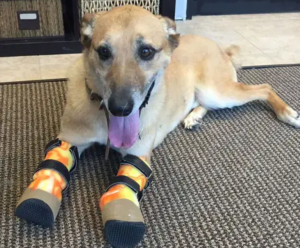The Dog That Survived
May 14, 2020

When “Pay de Limón” enters a room, the atmosphere immediately changes. On his face it seems that he always has a smile, his playful personality does not allow him to relive his sad past.
This dog, now 9 years old, is one of the victims of organized crime in Mexico.
In 2011, when he was 10 months old, he was found in a garbage dump in Zacatecas, after various operations to capture the leaders in that state of the Los Zetas criminal group, one of the most bloodthirsty in the country.
The puppy had been used by the cartel to practice torture methods they would later employ on their victims, such as finger cutting, which would render him unable to use his two front legs.
When the puppy was no longer useful for their experiments, he was left in a garbage can, bleeding, unable to move, and in a delicate state of health. An anonymous call alerted the Milagros Caninos Civil Association – located in Mexico City -, which managed to rescue the dog alive and move it to the country’s capital for treatment.
The suspicion that the Los Zetas Cartel had practiced their torture methods on the dog was verified by the neighbors, who came into contact with the group.
Milagros Caninos is a Civil Association dedicated to the rescue of sick, elderly, abused, and critically ill dogs, to try to turn their lives around.
Officially founded in 2006, the organization has a disabled dog area, one for tortured dogs, another for the elderly, a fifth for cancer patients, one for quarantine, one for rehabilitation, one for cats, and one area of therapies.
The case of “Pay de Limón” has moved Mexicans, perhaps because it is simple, brutal, and poignant evidence of the cruelty of the drug cartels.
“My intention was not to make his story known. I don’t remember how it got so big, how it started. I don’t know if I told it in any medium, but not in such detail, but this is how we have gone to various countries trying to promote non-animal abuse,” Patricia Ruiz, founder of the organization, said in 2016.
The dog needed a lot of petting and care to regain confidence in humans, but accepting prostheses that would allow him to walk again was one of the most difficult parts.
First, it was necessary to find him the perfect prostheses, which took him to Washington, where 3D ones were built, made of carbon fiber and a padded inner layer, which must be changed every year. For weeks he refused to accept them, so it was necessary to adapt to his times.
“First we put them on for 5 minutes, then 10, then 20, and so on all day, you just have to take them off at night, so he can rest,” Ruiz said.
Before “Pay de Limón” will return to run and play, he received psychological therapy to lose his fear of humans. “The vet did his part, but we had to give him another type of treatment based on loving caresses and doing everything as much as possible to earn their trust,” says Patricia.
This dog is not for adoption because he is now an activist for Milagros Caninos for the respect of animal rights.
Mexico ranks third in the world in animal abuse, according to information from the Chamber of Deputies. The National Institute of Statistics and Geography (INEGI) indicates that the animals that suffer the worst treatment in the country are dogs, of which only 30%, of approximately 18 million, have a home.
“Pay de Limón” now fights for two causes: ending animal abuse and that those responsible for organizing dog fights be punished, a crime that in Mexico City is punished with 4 years in prison, but rarely punished.
Up to $ 1,000 is awarded in these fights for each bout, which lasts approximately half an hour.
“Pay de Limón” became the first dog to enter the Mexican Chamber of Deputies three years ago; Although he did not make it to the rostrum, he expressed his desire that laws be drawn up that do justice to animals and that all those who do not respect them be punished.
Check Out Our Store

















